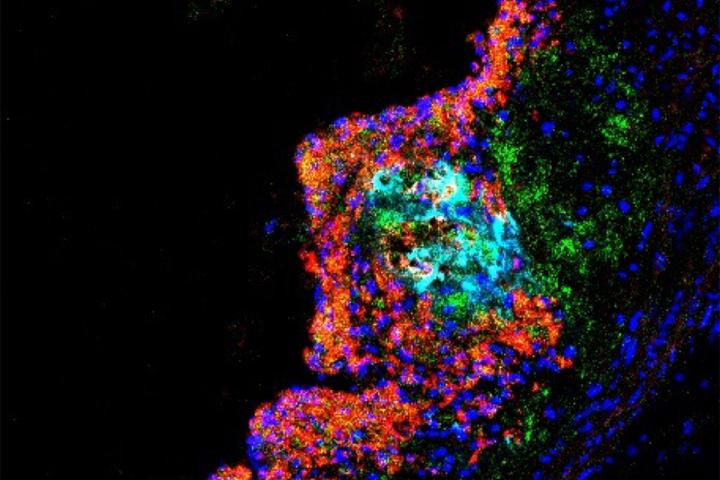Such diets lead to weight loss but could increase heart attack risk

Credit: Razani Lab
High-protein diets may help people lose weight and build muscle, but a new study in mice suggests they have a down side: They lead to more plaque in the arteries. Further, the new research shows that high-protein diets spur unstable plaque — the kind most prone to rupturing and causing blocked arteries. More plaque buildup in the arteries, particularly if it’s unstable, increases the risk of heart attack.
The new study, by researchers at Washington University School of Medicine in St. Louis, appears Jan. 23 in the journal Nature Metabolism.
“There are clear weight-loss benefits to high-protein diets, which has boosted their popularity in recent years,” said senior author Babak Razani, MD, PhD, an associate professor of medicine. “But animal studies and some large epidemiological studies in people have linked high dietary protein to cardiovascular problems. We decided to take a look at whether there is truly a causal link between high dietary protein and poorer cardiovascular health.”
The researchers studied mice fed a high-fat diet to deliberately induce atherosclerosis, or plaque buildup in the arteries. According to Razani, mice must eat a high-fat diet to develop arterial plaque. Therefore, some of the mice received a high-fat diet that was also high in protein. And others were fed a high-fat, low-protein diet for comparison.
“A couple of scoops of protein powder in a milkshake or a smoothie adds something like 40 grams of protein — almost equivalent to the daily recommended intake,” Razani said. “To see if protein has an effect on cardiovascular health, we tripled the amount of protein that the mice receive in the high-fat, high-protein diet — keeping the fat constant. Protein went from 15% to 46% of calories for these mice.”
The mice on the high-fat, high-protein diet developed worse atherosclerosis — about 30% more plaque in the arteries — than mice on the high-fat, normal-protein diet, despite the fact that the mice eating more protein did not gain weight, unlike the mice on the high-fat, normal-protein diet.
“This study is not the first to show a telltale increase in plaque with high-protein diets, but it offers a deeper understanding of the impact of high protein with the detailed analysis of the plaques,” Razani said. “In other words, our study shows how and why dietary protein leads to the development of unstable plaques.”
Plaque contains a mix of fat, cholesterol, calcium deposits and dead cells. Past work by Razani’s team and other groups has shown that immune cells called macrophages work to clean up plaque in arteries. But the environment inside plaque can overwhelm these cells, and when such cells die, they make the problem worse, contributing to plaque buildup and increasing plaque complexity.
“In mice on the high-protein diet, their plaques were a macrophage graveyard,” Razani said. “Many dead cells in the core of the plaque make it extremely unstable and prone to rupture. As blood flows past the plaque, that force — especially in the context of high blood pressure — puts a lot of stress on it. This situation is a recipe for a heart attack.”
To understand how high dietary protein might increase plaque complexity, Razani and his colleagues studied the path protein takes after it has been digested — broken down into its original building blocks, called amino acids.
Razani and his team found that excess amino acids from a high-protein diet activate a protein in macrophages called mTOR, which tells the cell to grow rather than go about its housecleaning tasks. The signals from mTOR shut down the cells’ ability to clean up the toxic waste of the plaque, and this sets off a chain of events that results in macrophage death. The researchers found that certain amino acids, especially leucine and arginine, were more potent in activating mTOR — and derailing macrophages from their cleanup duties, leading to cell death — than other amino acids.
“Leucine is particularly high in red meat, compared with, say, fish or plant sources of protein,” Razani said. “A future study might look at high-protein diets with different amino acid contents to see if that could have an effect on plaque complexity. Cell death is the key feature of plaque instability. If you could stop these cells from dying, you might not make the plaque smaller, but you would reduce its instability.
“This work not only defines the critical processes underlying the cardiovascular risks of dietary protein but also lays the groundwork for targeting these pathways in treating heart disease,” he said.
###
This work was supported by the National Institutes of Health (NIH), grant number R01 HL125838; VA MERIT, grant number I01 BX0034515; the American Diabetes Association, grant number 1-18-IBS-029; the Washington University Diabetic Cardiovascular Disease Center and Diabetes Research Center, grant number P30 DK020579; the Washington University Mass Spectrometry Core, grant numbers P41GM103422 and P30DK056341; and the Foundation for Barnes-Jewish Hospital.
Zhang X, Sergin I, Evans TD, Jeong S, Rodriguez-Velez A, Kapoor D, Chen S, Song E, Holloway KB, Crowley JR, Epelman S, Weihl CC, Diwan A, Fan D, Mittendorfer B, Stitziel NO, Schilling JD, Lodhi IJ, Razani B. High protein diets increase cardiovascular risk by activating macrophage mTOR to suppress mitophagy. Nature Metabolism. Jan. 23, 2020.
Washington University School of Medicine’s 1,500 faculty physicians also are the medical staff of Barnes-Jewish and St. Louis Children’s hospitals. The School of Medicine is a leader in medical research, teaching and patient care, ranking among the top 10 medical schools in the nation by U.S. News & World Report. Through its affiliations with Barnes-Jewish and St. Louis Children’s hospitals, the School of Medicine is linked to BJC HealthCare.
Media Contact
Diane Duke Williams
[email protected]
314-286-0111
Original Source
https:/
Related Journal Article
http://dx.




